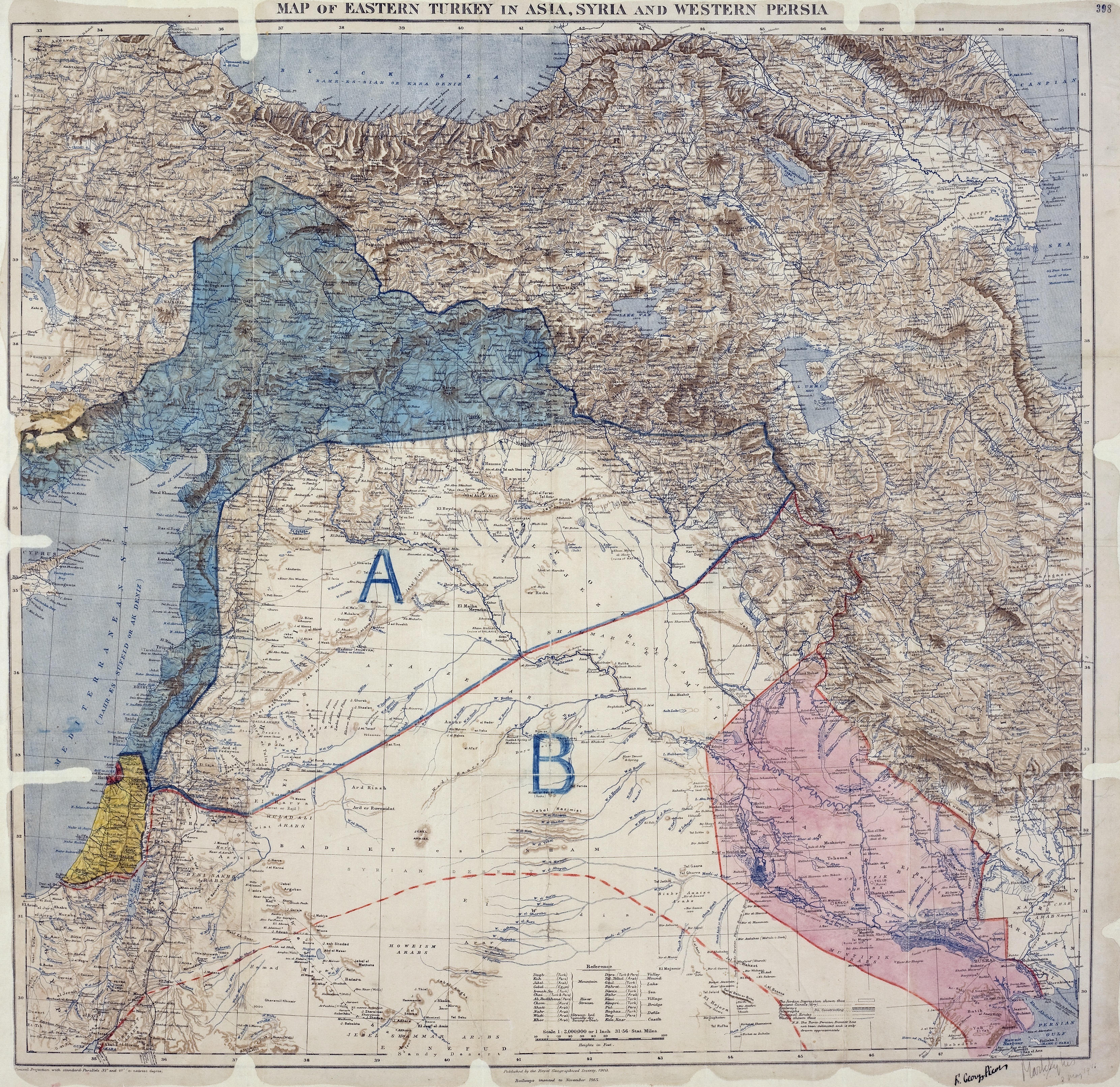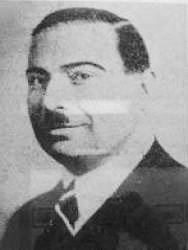|
Ibrahim Hananu
Ibrahim Hananu or Ibrahim Hanano (1869–1935) ( ar, إبراهيم هنانو, Ibrāhīm Hanānū) was an Ottoman municipal official and later a leader of a revolt against the French presence in northern Syria. He was a member of a notable landholding family of Kurdish origin in northern Syria. Early life and education Hananu was born to a wealthy family in Kafr Takharim and raised in Aleppo. There is dispute on his birth date: one source mentions he was born in 1879, while another mentions he was born in 1869. He studied at the Imperial High School in Aleppo, and continued his studies at the Ottoman Law Academy of the prestigious Mülkiye school in Constantinople. As a student, he joined the Committee of Union and Progress, the political organ that later took stage following the Young Turk Revolution of 1908. Early career and views Upon graduation, Hananu briefly taught at the military academy. Later, he joined the bureaucracy of the Ottoman Empire, only to retire and manag ... [...More Info...] [...Related Items...] OR: [Wikipedia] [Google] [Baidu] |
Kafr Takharim
Kafr Takharim ( ar, كَفْر تَخَارِيم, Kafr Takhārīm, also spelled Kafar Takhareem or Kfar Takharam) is a town in northwestern Syria, administratively part of the Idlib Governorate, located in the north of Idlib. Nearby localities include Harem to the north, Salqin to the northwest, Abu Talha to the west and Armanaz to the south. According to the Syria Central Bureau of Statistics, Kafr Takharim had a population of 10,084 in the 2004 census.General Census of Population and Housing 2004 . Syria Central Bureau of Statistics (CBS). Idlib Governorate. The town is also the administrative center of the Kafr Takharim '' |
Ayyash Al-Haj
Ayyash Al-Haj Hussein Al-Jassim, ( ar, عياش الحاج حسين الجاسم) a Syrian leader from Deir al-Zour city, began the armed struggle against the French colonizer in governorate of Deir al-Zour in 1925 coinciding with the outbreak of the Great Syrian Revolution in Jabal al-Arab and Ghouta of Damascus. He was sentenced by the French to exile to Jableh city with his family after they were convicted of planning and carrying out several military operations against the French forces, the latest was in " Ain Albu Gomaa". They also sentenced his eldest son Mohammed 20 years in prison on the island of Arwad, and executed his son Mahmoud by shooting with a number of other revolutionaries. Shortly after Ayyash Al-Haj family's living in Jableh, The French authorities assassinated Ayyash Al-Haj in a café outside the city by poisoning his coffee, and prevented the transfer of his body to Deir Ezzor city for reasons of public security, He was buried in Jableh in the cemet ... [...More Info...] [...Related Items...] OR: [Wikipedia] [Google] [Baidu] |
French Mandate Of Syria
The Mandate for Syria and the Lebanon (french: Mandat pour la Syrie et le Liban; ar, الانتداب الفرنسي على سوريا ولبنان, al-intidāb al-fransi 'ala suriya wa-lubnān) (1923−1946) was a League of Nations mandate founded in the aftermath of the First World War and the partitioning of the Ottoman Empire, concerning Syria and Lebanon. The mandate system was supposed to differ from colonialism, with the governing country intended to act as a trustee until the inhabitants were considered eligible for self-government. At that point, the mandate would terminate and an independent state would be born. During the two years that followed the end of the war in 1918—and in accordance with the Sykes–Picot Agreement signed by Britain and France during the war—the British held control of most of Ottoman Mesopotamia (modern Iraq) and the southern part of Ottoman Syria (Palestine and Transjordan), while the French controlled the rest of Ottoman Syria, Leban ... [...More Info...] [...Related Items...] OR: [Wikipedia] [Google] [Baidu] |
Syrian Constitution Of 1930
The Syrian Constitution of 1930, drafted by a committee under Ibrahim Hananu Ibrahim Hananu or Ibrahim Hanano (1869–1935) ( ar, إبراهيم هنانو, Ibrāhīm Hanānū) was an Ottoman municipal official and later a leader of a revolt against the French presence in northern Syria. He was a member of a notable landh ..., was promulgated by ''arrêté'' No. 3111 of High Commissioner Ponsot. It was the founding constitution of the First Syrian Republic under the French Mandate. On 25 March 1943, three ''arrêtés'' (Nos. 144, 146 & 154/FC) restored the constitution after it had been suspended in 1939 and provisionally regulated the organization of the executive and legislative powers, appointing different persons to exercise them pending elections which eventually took place on 10 and 26 July of the same year. After the Syrian Republic's independence, the Constitution of 1930 was revised on the 20 March 1948: Changes were made to Article 68, which granted the President ... [...More Info...] [...Related Items...] OR: [Wikipedia] [Google] [Baidu] |
National Bloc (Syria)
The National Bloc ( ar, الكتلة الوطنية ''Al-Kutlah Al-Wataniyah''; French: ''Bloc national'') was a Syrian political party that emerged to fight for Syrian independence during the French Mandate of Syria period. History The party was created after a national conference in 1928, by Ibrahim Hananu. It was not a structured party but rather a coalition of parties hostile to the French presence in Syria. The Bloc was led by notable conservatives; land owners, tradesmen, lawyers, etc. This coalition gathered the fifty most rich and powerful families of Syria. The political involvement of these notable people in the struggle for independence is reminiscent of the political struggle carried out in their youth against the Ottoman Empire. The National Bloc had no precise ideology, nor a social and economic agenda. The main objective which drove the movement forward was to return Syria's independence through diplomatic and non-violent actions. Legacy Full independence for S ... [...More Info...] [...Related Items...] OR: [Wikipedia] [Google] [Baidu] |
Great Syrian Revolt
The Great Syrian Revolt ( ar, الثورة السورية الكبرى) or Revolt of 1925 was a general uprising across the State of Syria and Greater Lebanon during the period of 1925 to 1927. The leading rebel forces comprised fighters of the Jabal Druze State in southern Syria, joined by Sunni, Druze, Alawite, and Christian factions. The common goal was to end French rule in the newly mandated regions, passed from Turkish to French administration following World War I. This revolution came in response to the repressive policies pursued by the French authorities under the Mandate for Syria and Lebanon, in dividing Syria into several occupied territories. The new French administration was perceived as being prejudiced against the dominant Arab culture and of intending to change the existing character of the country. In addition resentment was caused by the refusal of the French authorities to set a timetable for the independence of Syria. This revolution was an extensio ... [...More Info...] [...Related Items...] OR: [Wikipedia] [Google] [Baidu] |
Fathallah Saqqal
Fathallah Saqqal ( ar, فتح الله الصقال; 1898 – 27 March 1970) was a Syrian attorney, writer and government minister. He was well known for successfully arguing for Ibrahim Hananu's innocence in the French Mandatory courts in Syria regarding Hananu's participation in the Hananu Revolt between 1919 and 1921. Biography Saqqal was born in Aleppo in 1898 to father Michel Saqqal and mother Magida Baccache. The Saqqals were an Armenian Catholic family. Saqqal graduated from the French law school in Cairo, Egypt. Thereafter, he practiced law in the Mixed Courts of Egypt before returning to Aleppo in 1919 to open his own practice. During his first defense case, he argued his case in the elaborate manner he had grown accustomed to in Egypt, but which was frowned upon by the Ottoman court system and its Syrian successors, which preferred brief defense arguments (Syria had been part of the Ottoman Empire until 1918, after which it came under an informal Arab administration befo ... [...More Info...] [...Related Items...] OR: [Wikipedia] [Google] [Baidu] |
Franklin-Bouillon Agreement
The Ankara Agreement (1921) (or the Accord of Ankara; Franklin-Bouillon Agreement; Franco-Turkish Agreement of Ankara, Turkish: ''Ankara Anlaşması'' French: Traité d'Ankara) was signed on 20 October 1921"Ankara, Treaty of" in ''The New Encyclopædia Britannica''. Chicago: Encyclopædia Britannica Inc., 15th edn., 1992, Vol. 1, p. 423. at Ankara (also known as Angora) between France and the Grand National Assembly of Turkey, ending the Franco-Turkish War. The signatories were French diplomat Henry Franklin-Bouillon and Turkish foreign minister Yusuf Kemal Bey. Based on the terms of the agreement, the French acknowledged the end of the Franco-Turkish War and ceded large areas to Turkey. However other French units in Turkey were not affected, in return for economic concessions from Turkey. In return, the Turkish government acknowledged French imperial sovereignty over the French Mandate of Syria. The treaty was registered in ''League of Nations Treaty Series'' on 30 August 19 ... [...More Info...] [...Related Items...] OR: [Wikipedia] [Google] [Baidu] |
Anatolia
Anatolia, tr, Anadolu Yarımadası), and the Anatolian plateau, also known as Asia Minor, is a large peninsula in Western Asia and the westernmost protrusion of the Asian continent. It constitutes the major part of modern-day Turkey. The region is bounded by the Turkish Straits to the northwest, the Black Sea to the north, the Armenian Highlands to the east, the Mediterranean Sea to the south, and the Aegean Sea to the west. The Sea of Marmara forms a connection between the Black and Aegean seas through the Bosporus and Dardanelles straits and separates Anatolia from Thrace on the Balkan peninsula of Southeast Europe. The eastern border of Anatolia has been held to be a line between the Gulf of Alexandretta and the Black Sea, bounded by the Armenian Highlands to the east and Mesopotamia to the southeast. By this definition Anatolia comprises approximately the western two-thirds of the Asian part of Turkey. Today, Anatolia is sometimes considered to be synonymous w ... [...More Info...] [...Related Items...] OR: [Wikipedia] [Google] [Baidu] |
Cilicia
Cilicia (); el, Κιλικία, ''Kilikía''; Middle Persian: ''klkyʾy'' (''Klikiyā''); Parthian: ''kylkyʾ'' (''Kilikiyā''); tr, Kilikya). is a geographical region in southern Anatolia in Turkey, extending inland from the northeastern coasts of the Mediterranean Sea. Cilicia has a population ranging over six million, concentrated mostly at the Cilicia plain. The region includes the provinces of Mersin, Adana, Osmaniye, along with parts of Hatay and Antalya. Geography Cilicia is extended along the Mediterranean coast east from Pamphylia to the Nur Mountains, which separates it from Syria. North and east of Cilicia lie the rugged Taurus Mountains that separate it from the high central plateau of Anatolia, which are pierced by a narrow gorge called in antiquity the Cilician Gates. Ancient Cilicia was naturally divided into Cilicia Trachea and Cilicia Pedias by the Limonlu River. Salamis, the city on the east coast of Cyprus, was included in its administrative jurisdictio ... [...More Info...] [...Related Items...] OR: [Wikipedia] [Google] [Baidu] |
Levant
The Levant () is an approximate historical geographical term referring to a large area in the Eastern Mediterranean region of Western Asia. In its narrowest sense, which is in use today in archaeology and other cultural contexts, it is equivalent to a stretch of land bordering the Mediterranean in South-western Asia,Gasiorowski, Mark (2016). ''The Government and Politics of the Middle East and North Africa''. }, ), meaning "the eastern place, where the Sun rises". In the 13th and 14th centuries, the term ''levante'' was used for Italian maritime commerce in the Eastern Mediterranean, including Greece, Anatolia, Syria-Palestine, and Egypt, that is, the lands east of Venice. Eventually the term was restricted to the Muslim countries of Syria-Palestine and Egypt. In 1581, England set up the Levant Company to monopolize commerce with the Ottoman Empire. The name ''Levant States'' was used to refer to the French mandate over Syria and Lebanon after World War I. This is pro ... [...More Info...] [...Related Items...] OR: [Wikipedia] [Google] [Baidu] |







.png)